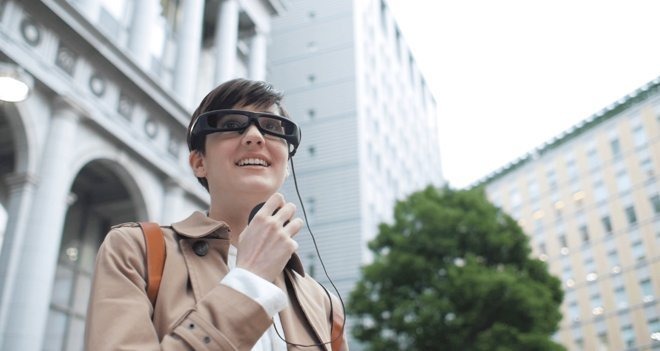Two recent Apple hires suggest the company is getting serious about building out its own virtual and augmented reality technologies, though Cupertino has some catching up to do as Google, Facebook and Microsoft forge ahead with mature projects.

Sony's prototype augmented reality glasses.
Earlier this month, Zeyu Li, a former Magic Leap employee who spent just over a year at that company, joined Apple as a Senior Computer Vision Algorithm Engineer, reports Business Insider. According to Li's LinkedIn profile, he worked on "cool stuff" while at the secretive merged reality startup, first as Lead 3D Engineer, then as Principal Engineer.
Apple's second hire comes from Facebook's Oculus. Yury Petrov, who worked as a research scientist at the VR firm since 2013, took an identical position at Apple in June. Petrov's LinkedIn profile says his job at Oculus entailed "psychophysical and physiological studies of visual and multisensory experience of virtual reality (VR) including user experience factors in head-mounted displays (HMD)."
With consumer interest in VR/AR experiences freshly renewed, in large part thanks to Oculus Rift, tech companies are jumping on the bandwagon with their own bespoke solutions. New miniaturization techniques and advanced sensor technology built for smartphones are the basis of many hardware kits, including those built by Oculus and Microsoft, but the world leader in portable technology, Apple, has yet to debut its own system.
Rumors of an Apple-branded VR/AR solution have floated for years. From patents for AR devices with transparent displays to iPhone-powered VR headsets, evidence of Apple's interest in the space is mounting.
During a quarterly investor conference call in January, CEO Tim Cook responded to a question about Apple's potential role in the future of VR, saying he thinks the technology is "cool" and has interesting applications. Expanded on those thoughts six months later during Apple's most recent earnings call, Cook confirmed investments in AR technology, adding that the potential for growth is huge.
Apple last year acquired motion capture specialist Faceshift and German AR firm Metaio.
Cook mentioned Apple's ongoing development of AR solutions in an interview in August, and did so again this week when speaking with ABC News' Robin Roberts. Asked about the prospect of Apple-branded VR/AR, Cook said that while VR promises "cool" applications for gaming and education, AR technology is of particular interest.
"There's virtual reality and there's augmented reality -- both of these are incredibly interesting," Cook said. "But my own view is that augmented reality is the larger of the two, probably by far."


